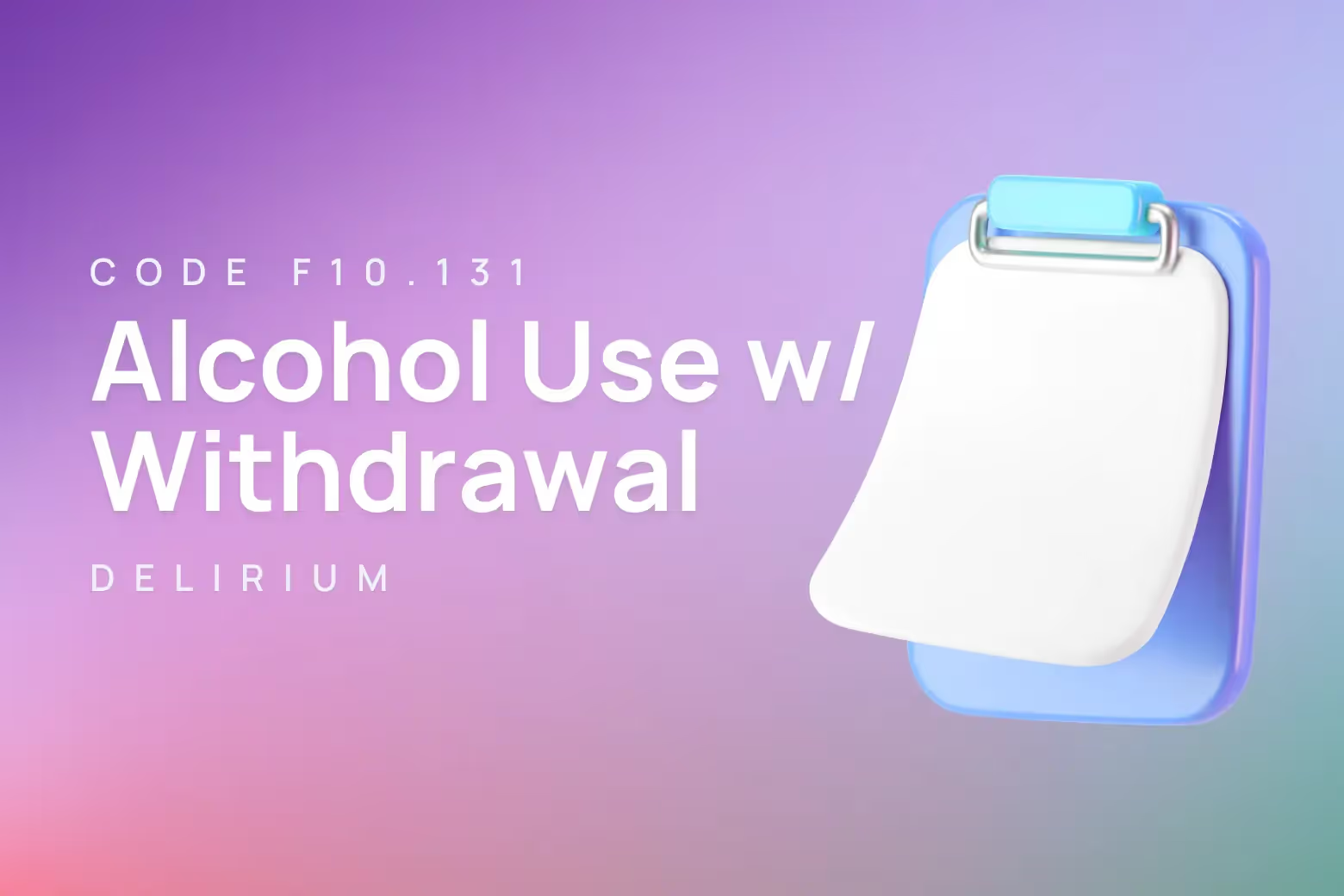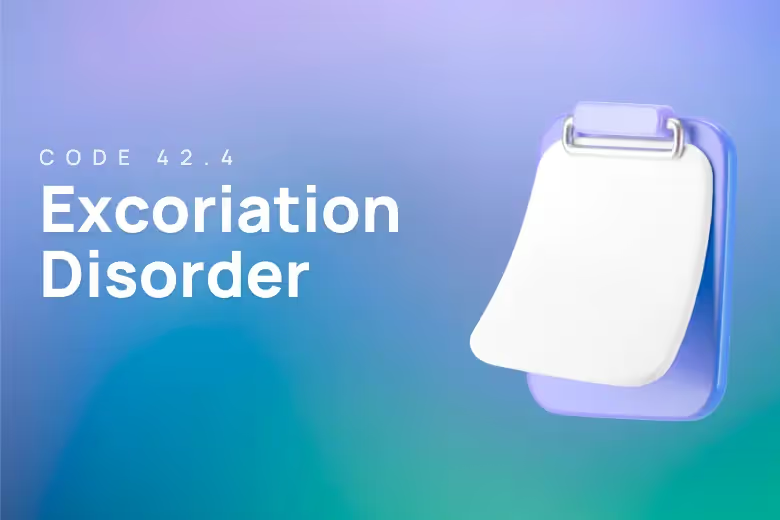ICD-10 code for alcohol abuse with withdrawal, delirium

F10.131 is the ICD-10 code for alcohol abuse with withdrawal, delirium.
This code represents a serious medical condition where someone meeting criteria for alcohol abuse experiences delirium during withdrawal from alcohol.
Accurate diagnosis becomes critical as this potentially life-threatening condition requires immediate medical intervention and specialized treatment.
Key features:
- F10.131 ICD-10 code combines alcohol abuse pattern with delirium tremens or alcohol withdrawal delirium
- Requires medical hospitalization and intensive monitoring for patient safety
- Distinguished from other withdrawal codes by presence of severe cognitive disruption
- Mortality risk significantly reduced with proper benzodiazepine treatment protocols

Diagnostic criteria for alcohol abuse with withdrawal, delirium (F10.131)
Clinicians must establish both components of this diagnosis to use F10.131 appropriately.
The alcohol abuse component requires documented patterns of problematic drinking that significantly impact daily functioning but don't meet full dependence criteria.
The withdrawal delirium component represents the most severe form of alcohol withdrawal syndrome.
Patients typically develop symptoms within 48-72 hours after their last drink, though onset can vary based on individual factors and drinking patterns.
Key diagnostic requirements include:
- Evidence of alcohol abuse pattern meeting ICD-10 criteria for harmful use
- Disturbance in attention with reduced ability to direct, focus, or maintain concentration
- Acute onset of cognitive changes developing over hours to days
- Additional cognitive disruptions including memory deficits, disorientation, or perceptual disturbances
- Clear evidence that symptoms result directly from alcohol withdrawal rather than other medical causes
- Fluctuating severity throughout the day with periods of relative clarity alternating with confusion
The condition manifests with profound confusion, disorientation, and severe agitation.
Patients frequently experience vivid hallucinations, typically visual but sometimes tactile or auditory. These perceptual disturbances often involve threatening or frightening content that increases patient distress and agitation levels.
When to use F10.131 diagnosis code
Differential diagnosis becomes particularly important when distinguishing F10.131 from related alcohol withdrawal conditions. Each code captures distinct presentations requiring different treatment approaches and monitoring levels.
F10.131 vs F10.130 (Alcohol abuse with withdrawal, uncomplicated)
The primary distinction lies in the presence or absence of delirium symptoms. F10.130 represents straightforward alcohol withdrawal without cognitive disruption or altered consciousness. Patients experience typical withdrawal symptoms like tremors, sweating, anxiety, and nausea but maintain clear thinking and awareness.
In contrast, F10.131 involves profound cognitive disruption with altered consciousness and severe confusion. These patients cannot maintain normal attention or awareness, requiring intensive medical supervision and specialized treatment protocols.
F10.131 vs F10.132 (Alcohol abuse with withdrawal with perceptual disturbance)
F10.132 involves perceptual disturbances during withdrawal but without the severe cognitive impairment characteristic of delirium. Patients may experience hallucinations or misperceptions while maintaining relatively clear consciousness and cognitive function.
F10.131 represents a more severe condition where perceptual disturbances occur alongside profound cognitive disruption, disorientation, and fluctuating consciousness levels requiring immediate hospitalization.
F10.131 vs F10.139 (Alcohol abuse with withdrawal, unspecified)
F10.139 serves as a placeholder when withdrawal complications are documented but specific features aren't clearly delineated. This code lacks the precision needed for proper treatment planning and resource allocation.
F10.131 provides specific diagnostic clarity about the presence of delirium, enabling appropriate medical responses and treatment protocols for this potentially fatal complication.
Related ICD-10 codes
- F10.13 - Alcohol abuse, with withdrawal
- F10.130 - Alcohol abuse with withdrawal, uncomplicated
- F10.132 - Alcohol abuse with withdrawal with perceptual disturbance
- F10.139 - Alcohol abuse with withdrawal, unspecified
Interventions and CPT codes for alcohol abuse with withdrawal, delirium
Emergency medical stabilization
F10.131 requires immediate medical intervention in hospital settings with continuous monitoring capabilities. Treatment focuses on controlling agitation while preventing complications that could prove fatal without proper management.
Initial stabilization involves:
- 90791 - Psychiatric diagnostic evaluation for comprehensive assessment and treatment planning
- 99291 - Critical care evaluation and management for first 30-74 minutes
- 99292 - Critical care evaluation and management for each additional 30 minutes
Benzodiazepine loading protocols
The gold standard treatment involves aggressive benzodiazepine loading to achieve light sedation quickly. This approach dramatically reduces mortality rates and prevents progression to more severe complications.
- 90834 - Psychotherapy for medication management and monitoring
- 90837 - Extended psychotherapy sessions for complex medication titration
- 96116 - Neurobehavioral status examination for cognitive assessment
Pharmacological management
Treatment typically requires high-dose benzodiazepines, often exceeding 100mg diazepam equivalent within the first 24 hours. Antipsychotic medications may be added for severe agitation but never replace adequate benzodiazepine therapy.
- 90832 - Psychotherapy for ongoing medication monitoring and adjustment
- 99231-99233 - Subsequent hospital care based on complexity level
- 99238 - Hospital discharge day management when medically stable
Family intervention and education
Family members require immediate education about the severity of the condition and their role in ongoing recovery support. This education becomes crucial for preventing future episodes and maintaining long-term sobriety.
- 90847 - Family psychotherapy with patient present
- 90846 - Family psychotherapy without patient present for crisis intervention
How Upheal improves F10.131 ICD-10 documentation
Suggesting appropriate ICD-10 codes based on session content
Clinical documentation for F10.131 requires precise attention to symptom timing, severity markers, and differential diagnosis considerations.
Upheal's clinical documentation platform helps identify key diagnostic indicators from session notes, ensuring proper code selection when delirium complicates alcohol withdrawal.
The platform recognizes patterns in clinical presentations that distinguish delirium from other withdrawal complications.
This capability proves particularly valuable when documenting the fluctuating nature of consciousness and cognitive function that characterizes this serious condition.
Maintaining HIPAA-compliant records with proper diagnostic coding
F10.131 diagnoses require detailed documentation of both the underlying abuse pattern and the acute delirium episode.
Upheal enables clinicians to maintain comprehensive records that capture the complexity of these presentations while ensuring all documentation meets regulatory requirements for this high-acuity condition.
Proper documentation becomes critical for insurance authorization of intensive care services and specialized treatment protocols required for alcohol withdrawal delirium management.
Reducing administrative burden so you can focus on client care
Managing F10.131 cases demands immediate clinical attention with minimal time for documentation during acute phases.
Upheal's automated documentation capabilities allow clinicians to maintain thorough records while dedicating full attention to life-saving interventions and continuous patient monitoring.
The platform ensures continuity of care documentation as patients transition from acute medical stabilization through rehabilitation phases, supporting comprehensive treatment planning throughout recovery.
Supporting clients with alcohol abuse with withdrawal, delirium
The journey from F10.131 to sustained recovery requires intensive medical intervention followed by comprehensive addiction treatment.
Clients who survive alcohol withdrawal delirium face significant challenges in maintaining long-term sobriety without ongoing support and evidence-based interventions.
Family education becomes particularly important given the severity of this presentation. Loved ones often feel overwhelmed by the medical crisis and need clear guidance about warning signs for future episodes.
Building strong support networks helps prevent the progression from abuse to more severe dependence patterns.
Modern treatment approaches combine immediate medical stabilization with motivational interviewing and cognitive-behavioral interventions once patients achieve medical stability.
The goal involves not only managing the acute crisis but building sustainable recovery practices that prevent future life-threatening episodes.
Upheal's clinical documentation platform supports providers throughout this complex treatment journey.
By handling detailed documentation requirements, Upheal lets clinicians focus their expertise on delivering the intensive, personalized care that clients with F10.131 require for optimal recovery outcomes.
Start your free trial today to experience how AI-powered documentation can improve your clinical practice while supporting better client outcomes.













